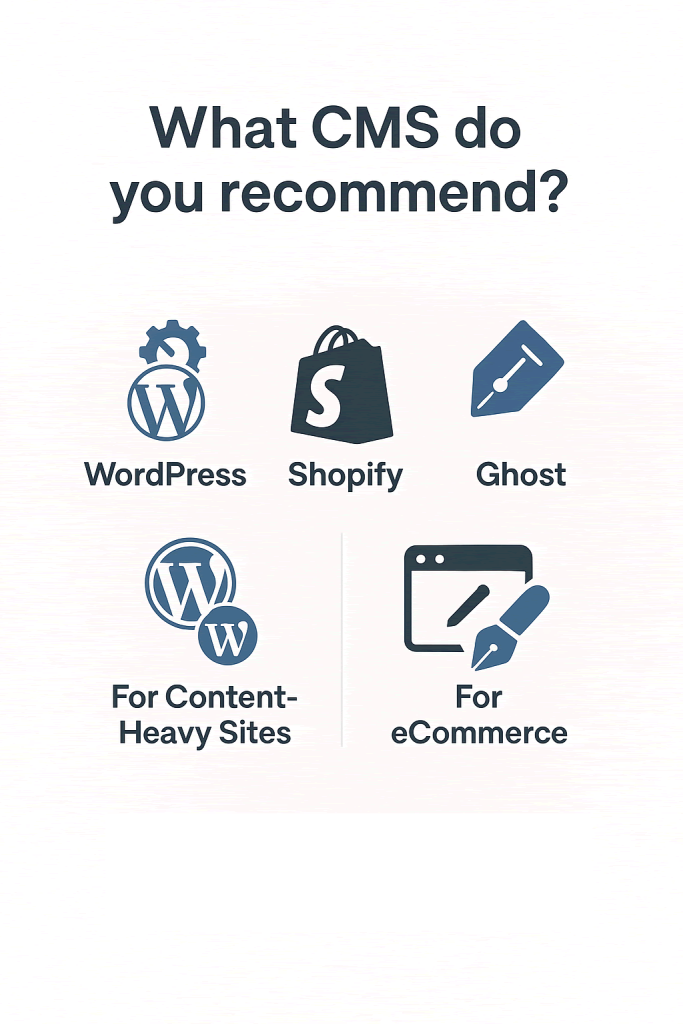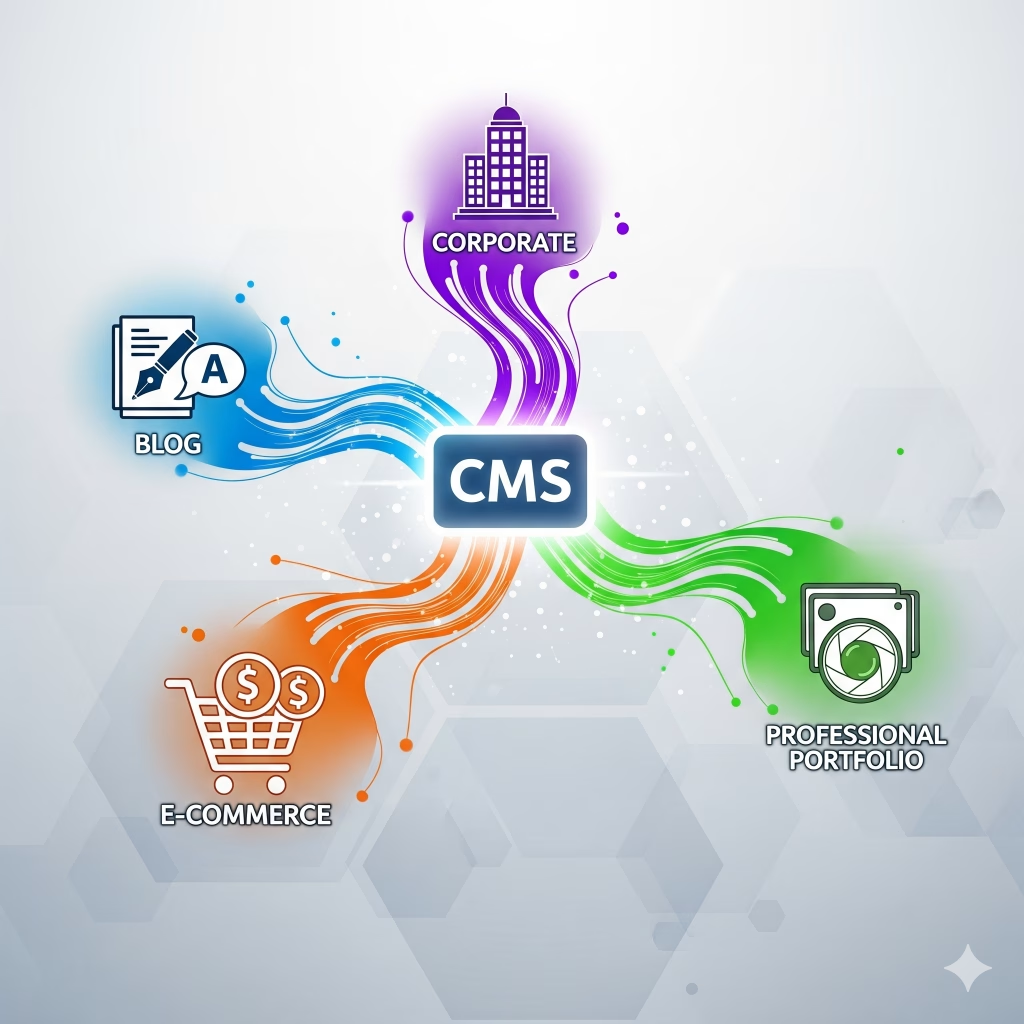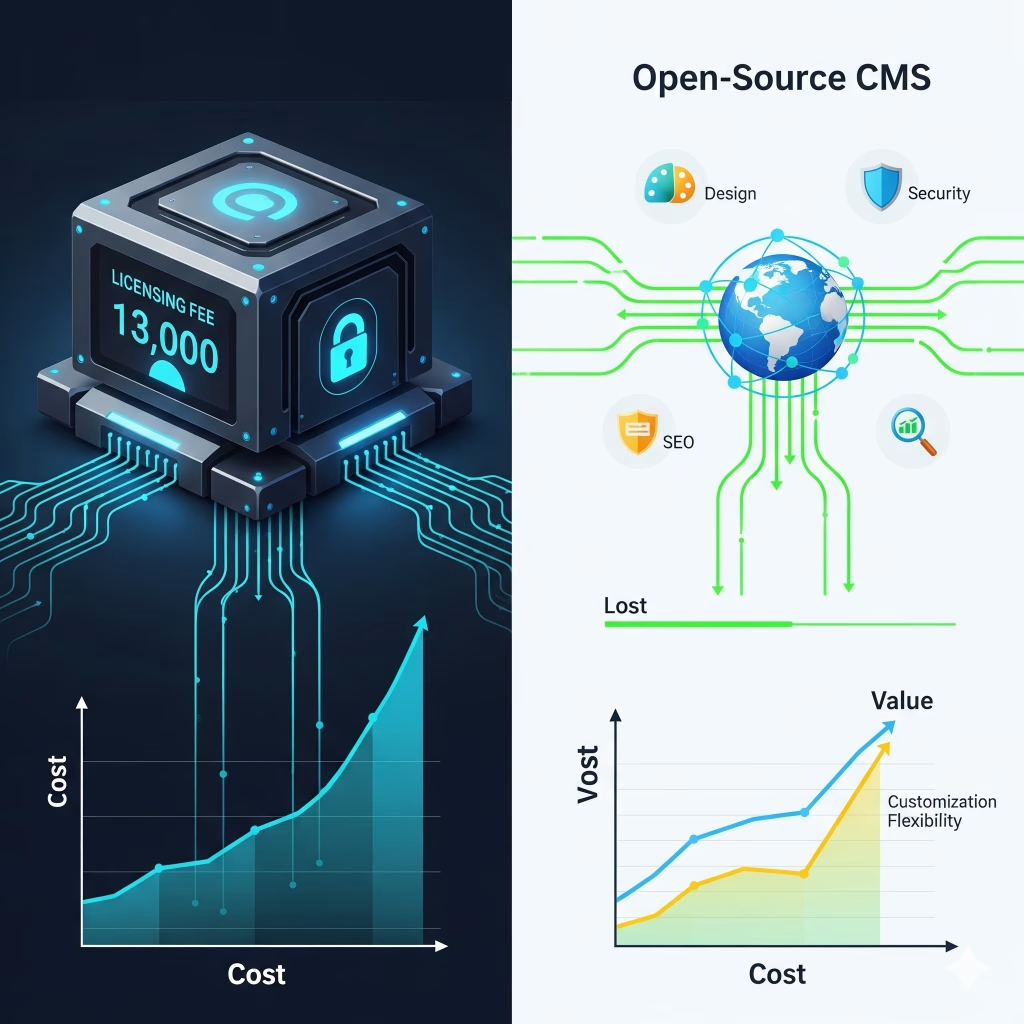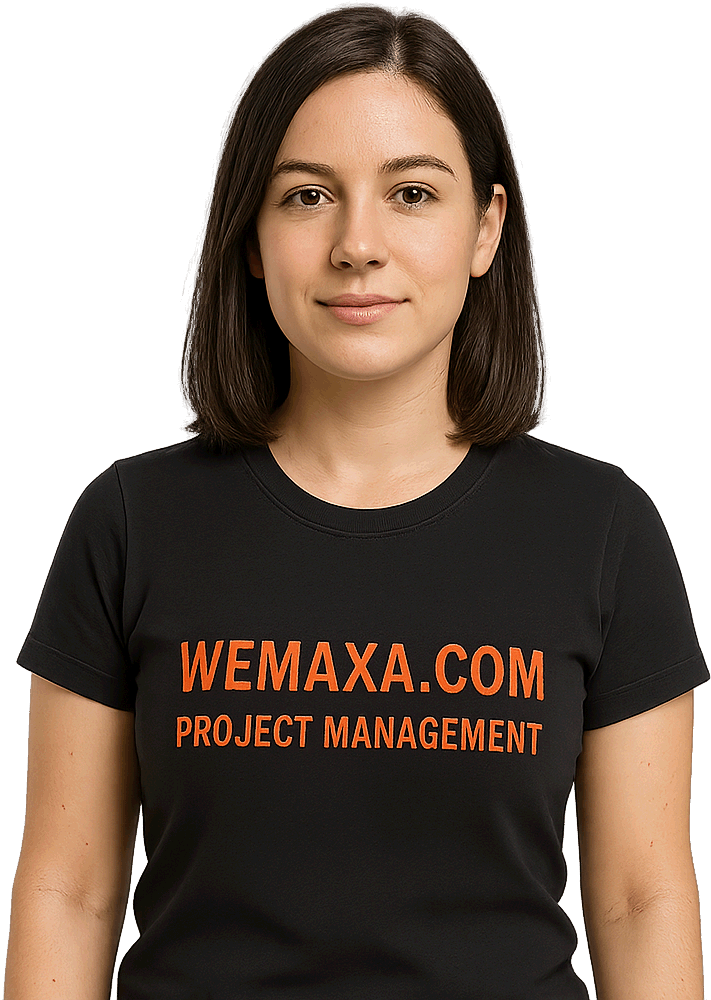WordPress is the most widely used CMS and a strong all-around choice for blogs, service-based websites, and content-heavy sites. It’s known for flexibility, thousands of plugins, and an active developer community. If you value customization, control, and scalability, WordPress offers a solid foundation for nearly any type of site. Paired with WooCommerce, it’s also a popular choice for e-commerce businesses that need full control over functionality and design.

For those who want a simpler, hosted solution, Shopify is excellent for online stores. It’s purpose-built for e-commerce and offers a clean interface, built-in tools, and strong support. You don’t have to worry about hosting or security updates, which makes it a great option if you want to focus on running your store without dealing with technical maintenance. Other strong platforms include Wix and Squarespace for visual websites with drag-and-drop editing, and Webflow for design-first projects that still need CMS functionality.
💡 Recommendation Summary:
| Use Case | CMS Recommendation |
|---|---|
| General website/blog | WordPress |
| Online store | Shopify |
| Developer-controlled design | Webflow |
| Developer-heavy backend | Strapi or Drupal |
| Fast content publishing | Ghost |
🥇 Best Overall: WordPress
- Use if: You want flexibility, thousands of themes/plugins, and community support.
- Strengths:
- Extremely user-friendly
- Massive plugin ecosystem (SEO, e-commerce, security, AI chatbots)
- Fully customizable with themes and custom code
- Best for: Blogs, portfolios, business websites, e-commerce (with WooCommerce), landing pages
- Weakness: Can bloat without optimization, relies on plugins for advanced features
🛒 Best for E-Commerce: Shopify
- Use if: You’re launching an online store and want everything managed.
- Strengths:
- Easy product/catalog setup
- Built-in payments, shipping, taxes
- Highly scalable for product-based businesses
- Weakness: Limited content management features outside of e-commerce
🧱 Best for Developers: Webflow or Ghost
- Webflow: Visual designer + CMS + hosting, excellent for frontend developers.
- Use if you need pixel-perfect control and animations
- Clean, fast code
- Ghost: Minimalist CMS built for content publishing, fast and headless-ready.
- Great for newsletter/blog-first websites
🏢 Best for Enterprise: Drupal
- Use if: You have developer resources and need security, scalability, and content workflows.
- Strengths:
- Fine-grained permissions
- Strong multilingual and taxonomy systems
- Enterprise-grade APIs
- Weakness: Steeper learning curve
🧑💻 Best for Headless/Modern Stack: Strapi or Sanity
- Use if: You want to use React, Vue, or another frontend framework.
- Strengths:
- API-first (REST/GraphQL)
- Frontend agnostic
- Ideal for mobile apps or Jamstack sites
- Weakness: Not for beginners or non-developers
MORE LINKS:
What is wordpress?
WordPress theming.
AI chatbot installation
WordPress for eshop
Who owns the CMS?
Updating wordpress
Managing content
Install plugins
WordPress security
WHAT CMS DO YOU RECOMMEND
The best CMS (Content Management System) for your website depends entirely on what you need it to do. There’s no one-size-fits-all platform, but there are standout options that serve different goals exceptionally well. Whether you’re building a blog, launching an online store, running a portfolio, or managing a corporate site, choosing the right CMS will make content updates easier, improve site performance, and help you grow more efficiently over time.
Ultimately, the right CMS depends on how much customization you need, who will be managing the content, and what kind of experience you want for your visitors. Each platform has strengths and trade-offs, so the best choice is the one that matches your content goals, technical comfort level, and long-term vision for your site. We can help you choose and set up the right system, so your site stays functional, flexible, and easy to manage.

When considering the question of which Content Management System (CMS) to recommend, it is important to first clarify what a CMS actually represents in the broader technological and business landscape. A CMS is not simply a piece of software that allows users to create and edit web pages; it is, in fact, a complete ecosystem that determines how businesses and individuals manage their digital identity, maintain online presence, publish content, handle scalability challenges, and ultimately communicate with their audience in a sustainable and cost-effective way. While some might believe that choosing a CMS is merely a technical decision reserved for developers or IT professionals, the truth is that this decision has deep implications across marketing strategy, branding, user experience, and even long-term financial planning. The wrong choice can lock you into proprietary solutions, incur hidden licensing fees, or severely limit your ability to scale as your online needs evolve, whereas the right choice empowers your business with flexibility, control, and the ability to evolve continuously. For a detailed industry perspective on the evolution of CMS platforms, you may refer to Gartner’s analysis of content platforms, which outlines how different solutions align with modern digital strategies.
At Wemaxa, we frequently recommend WordPress as the most practical and future-proof CMS for the majority of clients. This is not a generic endorsement but the result of careful evaluation of performance, cost, accessibility, community support, and adaptability. WordPress is open-source, which means there are no restrictive license fees, and it is maintained by one of the largest developer communities in the world. That community support ensures that security patches, new themes, advanced plugins, and integrations with marketing tools are constantly evolving to meet current digital demands. In contrast, proprietary CMS platforms often create a dependency on a single vendor, with little transparency over development priorities or pricing structures. WordPress empowers businesses to maintain control of their websites and to build digital strategies that are not subject to the whims of external providers. The breadth of available plugins enables everything from e-commerce to multilingual content management, and its architecture is flexible enough to accommodate small blogs, corporate websites, and enterprise-level portals. If you want to understand why WordPress remains such a dominant force, the W3Techs CMS usage statistics provide a data-driven overview of its global adoption.

Another crucial factor in our recommendation is the long-term cost of ownership. Many businesses are lured by sleek marketing campaigns from proprietary CMS vendors that promise simplicity and enterprise-ready functionality, only to realize later that ongoing costs for licensing, updates, hosting restrictions, and customization are unsustainable. WordPress, on the other hand, offers near-infinite extensibility with no licensing fees, which means your budget can be allocated toward meaningful customization, professional design, security hardening, and SEO strategy rather than simply paying for the privilege of access. Additionally, because of the massive ecosystem surrounding WordPress, businesses can choose from a wide range of providers for hosting, design, and support services, ensuring competitive pricing and flexibility in choosing partners. This competitive ecosystem contrasts sharply with closed CMS systems, where switching vendors often means abandoning the entire platform. For more insights on comparing CMS costs and benefits, resources like CIO’s CMS comparison guides are invaluable.
Finally, we cannot ignore the significance of scalability and adaptability. As digital strategies evolve, businesses require a CMS that can integrate seamlessly with marketing automation platforms, analytics suites, e-commerce systems, and even AI-driven personalization tools. WordPress has consistently demonstrated its ability to adapt to these emerging trends, offering integrations with platforms like Zapier for workflow automation, WooCommerce for online stores, and countless SEO optimization plugins that align with Google’s changing algorithms. This adaptability ensures that choosing WordPress today does not mean sacrificing relevance tomorrow. By contrast, selecting a closed or niche CMS may offer short-term gains in simplicity but often requires costly migrations once your business demands more advanced features. In essence, the decision to recommend WordPress is a recognition of its ecosystem, its global support, its cost-effectiveness, and its future-proof design. A CMS should not only serve as a tool for today but also as a foundation for tomorrow’s innovations, and in this regard, WordPress consistently outperforms its competitors. For further reading on digital transformation and the role of CMS platforms, you can explore in-depth studies from Forrester Research, which highlight how businesses use flexible CMS tools to achieve long-term growth.


